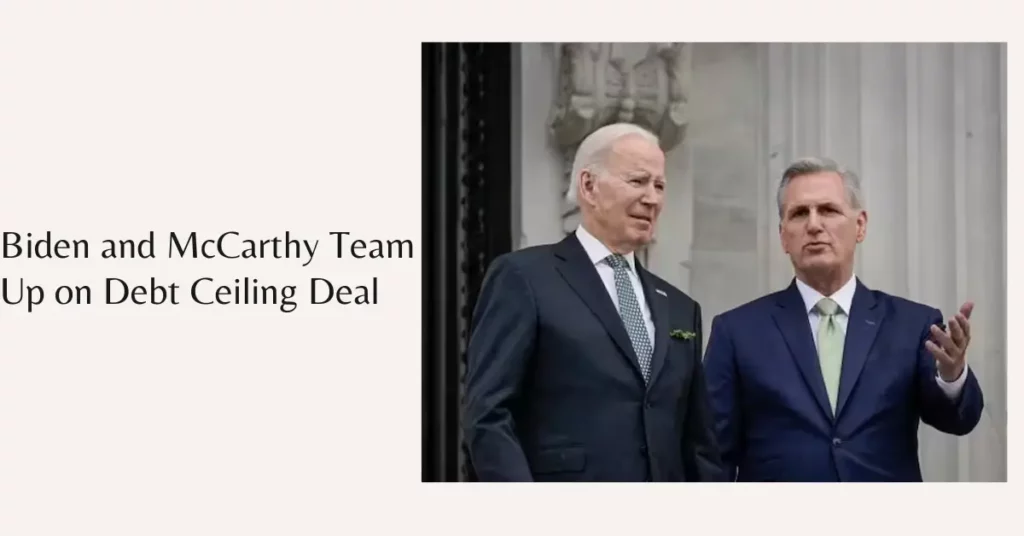After months of deadlock, U.S. President Joe Biden and top congressional Republican Kevin McCarthy have tentatively agreed to suspend the federal government’s $31.4 trillion debt cap.
The agreement was nonetheless unveiled in a somber tone that reflected the contentious nature of the talks and the challenging path it must travel through Congress before the United States runs out of money to pay its bills in early June.
“I just got off the phone with the president a bit ago. After he wasted time and refused to negotiate for months, we’ve come to an agreement in principle that is worthy of the American people,” McCarthy tweeted.
I just got off the phone with the president a bit ago. After he wasted time and refused to negotiate for months, we’ve come to an agreement in principle that is worthy of the American people.
I’ll deliver a statement at 9:10pm ET. Watch here:https://t.co/vmn31INPH5
— Kevin McCarthy (@SpeakerMcCarthy) May 28, 2023
In a statement, Biden called the agreement “an important step forward,” adding “The agreement represents a compromise, which means not everyone gets what they want. That’s the responsibility of governing.”
The agreement would restrain spending in the 2024 and 2025 budgets, recoup unused COVID monies, expedite the approval process for special energy projects, postpone the debt ceiling until January 2025, and impose additional work requirements for food assistance programs for low-income Americans.
After months of back and forth, the initial accord came together in a flurry of conversations. On Saturday night, Biden and McCarthy spoke on the phone for 90 minutes to discuss the agreement. Later that evening, McCarthy briefed his colleagues, and then the White House and the House speaker spoke.
McCarthy told reporters on Capitol Hill that “We still have more work to do tonight to finish the writing of it.” McCarthy stated that he anticipates finishing the bill’s drafting on Sunday, speaking with Biden, and having a vote on the agreement on Wednesday.
Finding a solution that can pass the House, where the Republicans hold a 222-213 majority, and the Senate, where the Democrats have a 51-49 majority, would require delicately treading the needle on both sides of the aisle before the president can sign it.
You can also read about other recent news we have covered on different topics and other specific people’s details:
- Fox News Reaches Settlement with Dominion in Defamation Battle
- Nebraska Takes a Decision New Bill Restricts Ab0rtion and Transgender Care
According to a source familiar with the agreement, negotiators have agreed to freeze non-defense discretionary spending at 2023 levels for one year before raising it by 1% in 2025.
“It has historic reductions in spending, consequential reforms that will lift people out of poverty into the workforce, rein in government overreach – there are no new taxes, no new government programs,” McCarthy said.
If the closely divided Congress approves the deal before the Treasury Department runs out of money to pay all of its obligations, which it warned on Friday will happen if the debt ceiling issue was not resolved by June 5th, it will prevent an economic unsettling default.
The pact received harsh criticism when initial details emerged from the House of Representatives Republicans, who had pushed for significant expenditure cuts and other requirements.
Conservative House Freedom Caucus member and Republican Representative Bob Good tweeted that he had heard the agreement would result in a $4 trillion debt increase. He added, “IF that is true, I don’t need to hear anything else. No one claiming to be a conservative could justify a YES vote.”
Earlier on Saturday, Dan Bishop of North Carolina referred to the agreement as “utter capitulation in progress.” holding the cards out to the side.
A House Freedom Caucus senior member stated that they were assessing member opinion and were unclear of the vote totals.
Republicans claim they want to reduce spending to stop the growth of the nation’s debt, which is currently about equivalent to the GDP of the entire country.
To reduce the debt, Biden and Democrats have pushed for more taxes on corporations and the rich while increasing expenditure on initiatives like community colleges that are entirely free.
Financial markets were alarmed by the prolonged impasse over extending the debt ceiling, which hurt stocks and had the US pay record-high interest rates in some bond sales.
According to analysts, a default would have a much more significant impact, possibly causing the country to enter a recession, unsettling the global economy, and increasing unemployment.
For months, Biden refused to discuss future expenditure cuts with McCarthy, insisting that lawmakers pass a “clean” debt limit rise first, devoid of any other restrictions, and then provide a 2024 budget proposal to challenge his budget from March.
On May 16, Biden and McCarthy started their formal bilateral talks. Raising the debt ceiling is still a work in progress. Before putting the bill up for a vote, McCarthy committed to giving House members 72 hours to read it.
That will demonstrate whether the bill’s compromises have the support of sufficient moderate members to override opposition from both hard-right Republicans and progressive Democrats and pass with a simple majority.
Then it must be approved by the Senate, requiring a minimum of nine Republican votes to pass. Every chamber along the road has numerous chances to slow down the procedure.
We have worked hard to provide you with helpful information. Therefore, it would mean a lot to us if you would check out —where you may read articles directly related to your quest. If you have any questions or feedback, please don’t hesitate to let us know in the comments below.

